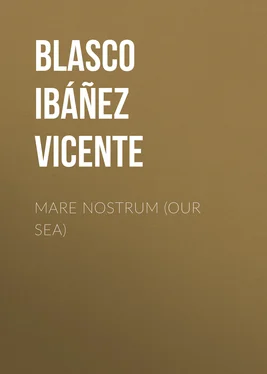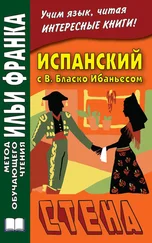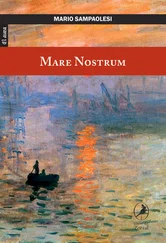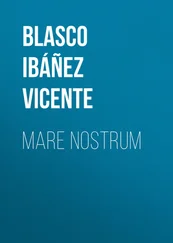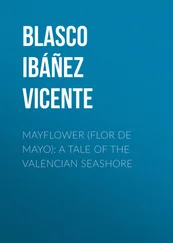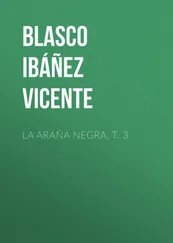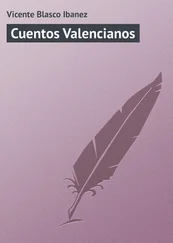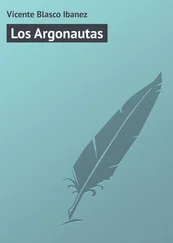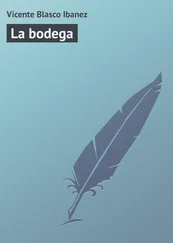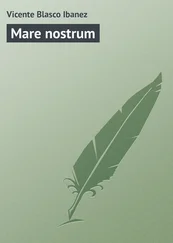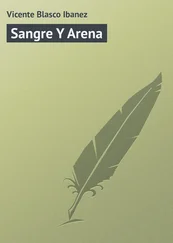Vicente Blasco Ibáñez - Mare Nostrum (Our Sea)
Здесь есть возможность читать онлайн «Vicente Blasco Ibáñez - Mare Nostrum (Our Sea)» — ознакомительный отрывок электронной книги совершенно бесплатно, а после прочтения отрывка купить полную версию. В некоторых случаях можно слушать аудио, скачать через торрент в формате fb2 и присутствует краткое содержание. Жанр: foreign_prose, foreign_antique, на английском языке. Описание произведения, (предисловие) а так же отзывы посетителей доступны на портале библиотеки ЛибКат.
- Название:Mare Nostrum (Our Sea)
- Автор:
- Жанр:
- Год:неизвестен
- ISBN:нет данных
- Рейтинг книги:5 / 5. Голосов: 1
-
Избранное:Добавить в избранное
- Отзывы:
-
Ваша оценка:
- 100
- 1
- 2
- 3
- 4
- 5
Mare Nostrum (Our Sea): краткое содержание, описание и аннотация
Предлагаем к чтению аннотацию, описание, краткое содержание или предисловие (зависит от того, что написал сам автор книги «Mare Nostrum (Our Sea)»). Если вы не нашли необходимую информацию о книге — напишите в комментариях, мы постараемся отыскать её.
Mare Nostrum (Our Sea) — читать онлайн ознакомительный отрывок
Ниже представлен текст книги, разбитый по страницам. Система сохранения места последней прочитанной страницы, позволяет с удобством читать онлайн бесплатно книгу «Mare Nostrum (Our Sea)», без необходимости каждый раз заново искать на чём Вы остановились. Поставьте закладку, и сможете в любой момент перейти на страницу, на которой закончили чтение.
Интервал:
Закладка:
The ancient world only knew the immense ocean in hypothesis, giving it the form of an aquatic girdle around the earth. Oceanus was an old god with a long beard and horned head who lived in a maritime cavern with his wife, Tethys, and his three hundred daughters, the Oceanides. No Argonaut had ever dared to come in contact with these mysterious divinities. Only the grave Aeschylus had dared to portray the Oceanides—virgins fresh and demure, weeping around the rock to which Prometheus was bound.
Other more approachable deities were those of the eternal sea on whose borders were founded the opulent cities of the Syrian coast; the Egyptian cities that sent sparks of their ritual civilization to Greece; the Hellenic cities, hearths of clear fire that had fused all knowledge, giving it eternal form; Rome, mistress of the world; Carthage, famed for her audacious geographical discoveries, and Marseilles, which had made western Europe share in the civilization of the Greeks, scattering it along the lower coast from settlement to settlement, even to the Straits of Cadiz.
A brother of the Oceanides, the prudent Nereus, used to reign in the depths of the Mediterranean. This son of Oceanus had a blue beard, green eyes, and bunches of sea rushes on his eyebrows and breast. His fifty daughters, the Nereids, bore his orders across the waves or frolicked around the ships, splashing in the faces of the rowers the foam tossed up by their arms. But the sons of Father Time, on conquering the giant, had reapportioned the world, determining its rulers by lot. Zeus remained lord of the land, the obscure Hades, lord of the underworld, reigned in the Plutonic abysses, and Poseidon became master of the blue surfaces.
Nereus, the dispossessed monarch, fled to a cavern of the Hellenic sea in order to live the calm existence of the philosopher-counselor of mankind, and Poseidon installed himself in the mother-of-pearl palaces with his white steeds tossing helmets of bronze and manes of gold.
His amorous eyes were fixed on the fifty Mediterranean princesses, the Nereids, who took their names from the aspect of the waves—the Blue, the Green, the Swift, the Gentle…. "Nymphs of the green abysses with faces fresh as a rosebud, fragrant virgins that took the forms of all the monsters of the deep," sang the Orphic hymn on the Grecian shore. And Poseidon singled out among them all the Nereid of the Foam, the white Amphitrite who refused to accept his love.
She knew about this new god. The coasts were peopled with cyclops like Polyphemus, with frightful monsters born of the union of Olympian goddesses and simple mortals; but an obliging dolphin came and went, carrying messages between Poseidon and the Nereid, until, overwhelmed by the eloquence of this restless rover of the wave, Amphitrite agreed to become the wife of the god, and the Mediterranean appeared to take on still greater beauty.
She was the aurora that shows her rosy finger-tips through the immense cleft between sky and sea, the warm hour of midday that makes the waters drowsy under its robe of restless gold, the bifurcated tongue of foam that laps the two faces of the hissing prow, the aroma-laden breeze that like a virgin's breath swells the sail, the compassionate kiss that lulls the drowned to rest, without wrath and without resistance, before sinking forever into the fathomless abyss.
Her husband—Poseidon on the Greek coast and Neptune on the Latin—on mounting his chariot, used to awaken the tempest. The brazen-hoofed horses with their stamping would paw up the huge waves and swallow up the ships. The tritons of his cortege would send forth from their white shells the bellowing blasts that snap off the masts like reeds.
O, mater Amphitrite !… and Ferragut would describe her as though she were just passing before his eyes. Sometimes when swimming around the promontories, feeling himself enveloped like primitive man in the blind forces of Nature, he used to believe that he saw the white goddess issuing forth from the rocks with all her smiling train after a rest in some marine cave.
A shell of pearl was her chariot and six dolphins harnessed with purpling coral used to draw it along. The tritons, her sons, handled the reins. The Naiads, their sisters, lashed the sea with their scaly tails, lifting their mermaid bodies wrapped in the magnificence of their sea-green tresses between whose ringlets might be seen their heaving bosoms. White seagulls, cooing like the doves of Aphrodite, fluttered around their nude sea-queen, serenely contemplating them from her movable throne, crowned with pearls and phosphorescent stars drawn from the depths of her dominion. White as the cloud, white as the sail, white as the foam, entirely, dazzlingly white was her fair majesty except where a rosy blush tinted the petal-like skin of her heels or her bosom.
The entire history of European man—forty centuries of wars, emigrations, and racial impact—was due, according to the doctor, to the desire of possessing this harmoniously framed sea, of enjoying the transparency of its atmosphere and the vivacity of its light.
The men from the North who needed the burning log and alcoholic drink in order to defend their life from the clutches of the cold, were always thinking of these Mediterranean shores. All their warlike or pacific movements were with intent to descend from the coasts of the glacial seas to the beaches of the warm mare nostrum . They were eager to gain possession of the country where the sacred olive alternates its stiff old age with the joyous vineyard; where the pine rears its cupola and the cypress erects its minaret. They longed to dream under the perfumed snow of the interminable orange groves; to be masters of the sheltered valleys where the myrtle and the jasmine spice the salty air; where the aloe and the cactus grow between the stones of extinct volcanoes; where the mountains of marble extend their white veins down even into the depths of the sea and refract the African heat emitted by the opposite coast.
The South had replied to the invasion from the North with defensive wars that had extended even into the center of Europe. And thus history had gone on repeating itself with the same flux and reflux of human waves—mankind struggling for thousands of years to gain or hold the blue vault of Amphitrite.
The Mediterranean peoples were to Ferragut the aristocracy of humanity. Its potent climate had tempered mankind as in no other part of the planet, giving him a dry and resilient power. Tanned and bronzed by the profound absorption of the sun and the energy of the atmosphere, its navigators were transmuted into pure metal. The men from the North were stronger, but less robust, less acclimitable than the Catalan sailor, the Provençal, the Genoese or the Greek. The sailors of the Mediterranean made themselves at home in all parts of the world. Upon their sea man had developed his highest energies. Ancient Greece had converted human flesh into spiritual steel.
Exactly the same landscapes and races bordered the two shores. The mountains and the flowers on both shores were identical. The Catalan, the Provençal and the South Italian were more like the inhabitants of the African coast than their kindred who lived inland back of them. This fraternity had shown itself instinctively in the thousand-year war. The Berber pirates, the Genoese sailors, the Spaniards, and the Knights of Malta used implacably to behead each other on the decks of their galleys and, upon becoming conquerors, would respect the life of their prisoners, treating them like gentlemen. The Admiral Barbarossa, eighty-four years of age, used to call Doria, his eternal rival nearly ninety years old, "my brother." The Grand Master of Malta clasped the hand of the terrible Dragut upon finding him his captive.
The Mediterranean man, fixed on the shores that gave him birth, was accustomed to accept all the changes of history, as the mollusks fastened to the rocks endure the tempests. For him the only important thing was not to lose sight of his blue sea. The Spaniard used to pull an oar on the Liburnian felucca, the Christian would join the crews of the Saracen ships of the Middle Ages; the subjects of Charles V would pass through the fortunes of war from the galleys of the Cross to those of the Crescent, and would end by becoming rulers of Algiers, rich captains of the sea, or by making their names famous as renegades.
Читать дальшеИнтервал:
Закладка:
Похожие книги на «Mare Nostrum (Our Sea)»
Представляем Вашему вниманию похожие книги на «Mare Nostrum (Our Sea)» списком для выбора. Мы отобрали схожую по названию и смыслу литературу в надежде предоставить читателям больше вариантов отыскать новые, интересные, ещё непрочитанные произведения.
Обсуждение, отзывы о книге «Mare Nostrum (Our Sea)» и просто собственные мнения читателей. Оставьте ваши комментарии, напишите, что Вы думаете о произведении, его смысле или главных героях. Укажите что конкретно понравилось, а что нет, и почему Вы так считаете.
